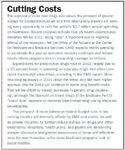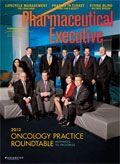Breakthrough Year for New Drugs
More new medicines gained market approval in 2012, but marketers face resistance from payers looking to cut healthcare spending, writes Jill Wechsler.
The Food and Drug Administration hit a 16-year high in approving 39 new drugs in 2012, building on a continued rise in commercial INDs (investigational new drug applications) filed with the agency and provisions of the FDA Safety & Innovation Act (FDASIA) that encourage innovation and improve review operations. FDA had already approved more than 30 new molecular entities (NMEs) by early December, and eight more positive decisions emerged before year-end, including treatments for cancer, a rare leukemia, chicken pox, and drug-resistant tuberculosis.

Jill Wechsler
Moreover, there's no more drug lag with Europe, according to John Jenkins, director of the Office of New Drugs in the Center for Drug Evaluation and Research (CDER), noting that more than 80 percent of last year's NMEs were first approved in the United States. And a continuing influx of INDs promises more new drugs in the future.
Targeted treatments
Prescription drug user fees authorized by FDASIA provide the agency with more resources to assist sponsors in proposing appropriate research programs and in filing more complete applications, a key metric in achieving more first-cycle approvals, Jenkins noted at Elsevier's FDA/CMS Summit in December 2012. FDA processed more than 70 percent of priority applications in one cycle in 2012, and 60 percent of standard NMEs. It helps that many of the applications were for targeted drugs with large effect size and for rare disease therapies with clear benefit/risk ratios.
A further stimulus for the development of more medicines for critical diseases may come from guidance in the works that will clarify the opportunities and requirements created by FDA's various expedited approval pathways—fast track, breakthrough, priority review, and accelerated approval. And new liaison staffers can provide assistance in navigating the FDA review system, which should be particularly helpful for the growing number of "emerging sponsors" filing their first new drug applications.
Bob Temple, CDER deputy director for clinical science, noted at the Elsevier conference that it's not new for FDA to approve highly innovative products based on limited clinical evidence, but that FDASIA is helpful by clearly instructing CDER to facilitate approval of "drugs with impact." The rise in new drug approvals, he observed, reflects an increase in very well-targeted cancer drugs with "huge effects" in specific populations, an approach that he hopes can be applied to other conditions, such as asthma.
Temple also is looking to wider use of enrichment strategies in clinical trials to accelerate drug development, as described in a December guidance outlining methods for decreasing heterogeneity and for selecting patients likely to respond to treatment. Temple has supported such study designs for years and anticipates that the guidance will encourage smaller, faster clinical trials that can speed critical drugs to patients. "While enrichment won't save a drug that doesn't work," Temple notes in an FDA blog, "it will help find one that will."
Legal challenges
While FDA approval of more new drugs is welcome news for patients, providers, and pharma companies, that success also is intensifying efforts to save money by uncovering fraud and waste in federal and state drug benefits. Several leading senators are demanding greater scrutiny of waste in Medicare Part D outlays. And it could get much worse, as pharma companies contend with a host of new "compliance challenges," notes Paul Keckley of Deloitte Center for Health Solutions. The list includes changes to the Medicaid Average Manufacturer Price (AMP) definition, expansion of drug classes subject to Medicaid rebates, pricing changes for 340B entities, the new Branded Prescription Drug Fee now applied to revenues from government contracts, and pending "Sunshine" payment disclosure requirements.
Law enforcement agencies also are revving up scrutiny of drug manufacturing activities. Most high-profile pharma legal cases in recent years have targeted off-label marketing and related pricing and promotional activities. That will continue, as seen in a wave of late-2012 settlements: Pfizer agreed to pay nearly $100 million to resolve federal and state charges for illegal off-label marketing; Amgen settled charges related to violative marketing of several leading therapies for $762 million; and Sanofi paid $109 million to resolve kickback charges related to an injectible treatment. These fines are paltry, though, compared to earlier billion-dollar settlements, with GlaxoSmithKline's $3 billion fine in July 2012 topping the list. While prosecutors expect more violative marketing cases, there may be a slow-down as lawyers and litigators digest the impact of the recent Caronia case and whether that undermines FDA's authority to limit a marketer's ability to discuss off-label claims that are not false or misleading.

Cutting Costs
Consequently, the feds anticipate a rise in legal actions involving lax adherence to current good manufacturing practices (cGMPs) that result in adulterated products. With manufacturing problems linked to devastating drug shortages and deaths associated with contaminated compounded injectibles, drug quality issues have become more prominent on the law enforcement radar screen.
More whistleblowers are going to qui tam lawyers with evidence of violations related to GMPs for drugs and biologics, observed former Department of Justice (DoJ) official Eugene Thirolf at the December enforcement conference sponsored by the Food and Drug Law Institute (FDLI). In deciding whether or not to bring a case, DoJ's consumer protection branch looks to assess how bad was the misconduct, whether it was condoned by management, whether the alleged activity affects the integrity of the drug regulatory process and the broader impact of GMP enforcement on consumers. The feds don't expect settlement payments in GMP cases to be as large as those from off-label marketing suits, but manufacturing issues raise the possibility of charges against individual corporate executives, including penalties that exclude an individual from doing business with the government.
Jill Wechsler is Pharm Exec's Washington correspondent. She can be reached at jwechsler@advanstar.com.
Navigating Distrust: Pharma in the Age of Social Media
February 18th 2025Ian Baer, Founder and CEO of Sooth, discusses how the growing distrust in social media will impact industry marketing strategies and the relationships between pharmaceutical companies and the patients they aim to serve. He also explains dark social, how to combat misinformation, closing the trust gap, and more.

.png&w=3840&q=75)

.png&w=3840&q=75)



.png&w=3840&q=75)



.png&w=3840&q=75)















